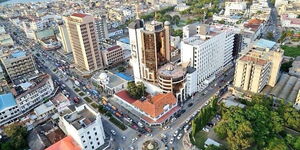Are you experiencing extremely hot days and nights? Well, the Kenya Meteorological Department (KMD) has explained why many Kenyans are feeling increased temperatures.
Speaking to the press on Saturday, March 19, the Kenya Met Deputy Director David Koros stated that the heat is a result of the equinox, a time when the sun is overhead the Equator hence nearer to earth.
In Nairobi, the temperatures shot up from 25°C to the current 32°C. Koros noted that the spike affects 13 countries through which the Equator passes, Kenya being one of them.
The weatherman further noted that this year's equinox was worsened by the global warming that has seen temperatures shoot up in recent years.
"There is something we call Equinox which is very important. When the sun approaches the Equator, and we are on the Equator, We are remaining with three days to get to 21st, that is what is remaining for the sun to get passed Kenya.
"This is also attributed to the atmospheric conditions which have already changed so fast. These are conditions that normally control the weather that we observe and predict. They include the distribution of the moisture content and water vapor. There is an increase emanating from the west and moving to the East," explained Koros as per Citizen TV.
Koros further explained that the effects would be felt until March 21 when the sun is expected to get passed the East African region.
"What we are observing now is the evidence in terms of what is going on there in terms of global warming. The temperatures have started going up.
"Erratic change in the weather patterns. The rainfalls, which we used to have higher amounts in April are no longer in April, it changed," he added.
An equinox occurs approximately twice a year (mostly on September 22 and March 20) and is estimated that the day and night have approximately the same length.
Regarding the increase in temperatures and erratic weather patterns, the weather expert advised Kenyans not to be worried since the heavy rainfall is expected to begin in the last week of March all through to May.
"Several parts of the country are likely to experience significant rainfall during the fourth week of March... The season is expected to experience a normal onset with fair distribution over the whole country except for the ASAL regions of Northwest, Northeast and the Coast which will experience poor rainfall distribution," read part of KMD statement dated March 15, 2022.












